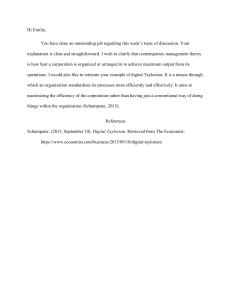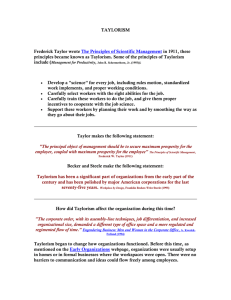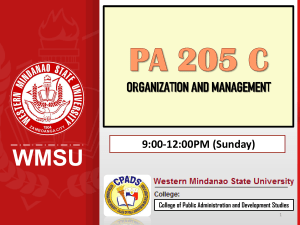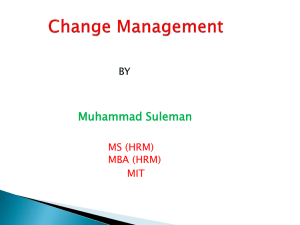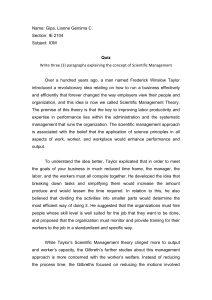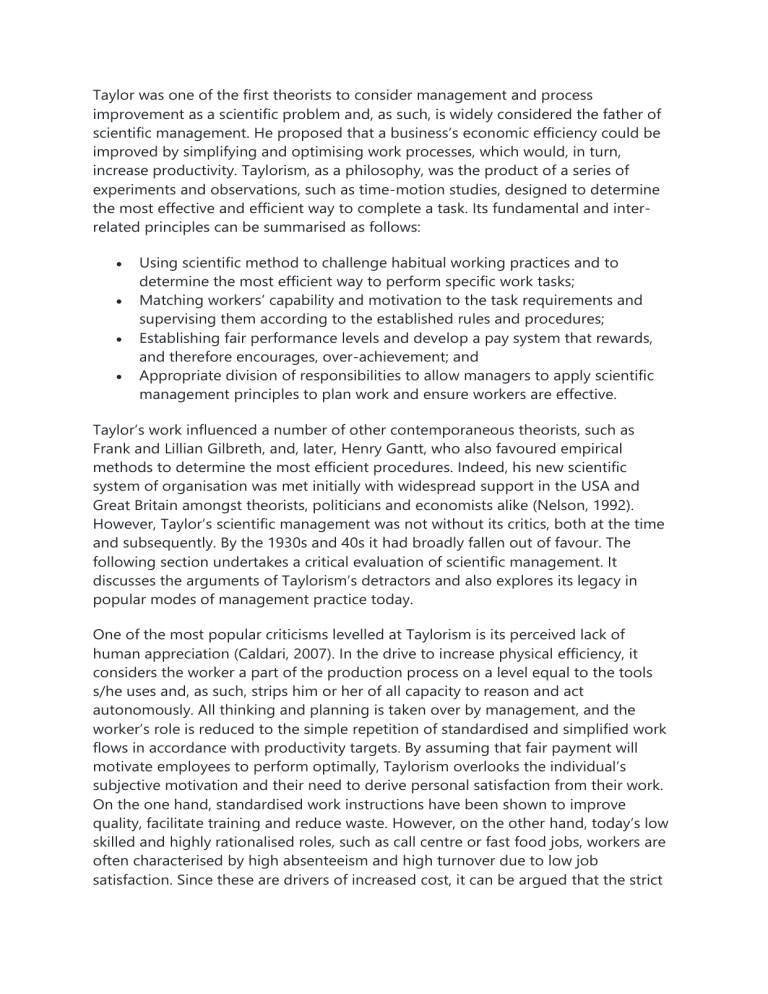
Taylor was one of the first theorists to consider management and process improvement as a scientific problem and, as such, is widely considered the father of scientific management. He proposed that a business’s economic efficiency could be improved by simplifying and optimising work processes, which would, in turn, increase productivity. Taylorism, as a philosophy, was the product of a series of experiments and observations, such as time-motion studies, designed to determine the most effective and efficient way to complete a task. Its fundamental and interrelated principles can be summarised as follows: Using scientific method to challenge habitual working practices and to determine the most efficient way to perform specific work tasks; Matching workers’ capability and motivation to the task requirements and supervising them according to the established rules and procedures; Establishing fair performance levels and develop a pay system that rewards, and therefore encourages, over-achievement; and Appropriate division of responsibilities to allow managers to apply scientific management principles to plan work and ensure workers are effective. Taylor’s work influenced a number of other contemporaneous theorists, such as Frank and Lillian Gilbreth, and, later, Henry Gantt, who also favoured empirical methods to determine the most efficient procedures. Indeed, his new scientific system of organisation was met initially with widespread support in the USA and Great Britain amongst theorists, politicians and economists alike (Nelson, 1992). However, Taylor’s scientific management was not without its critics, both at the time and subsequently. By the 1930s and 40s it had broadly fallen out of favour. The following section undertakes a critical evaluation of scientific management. It discusses the arguments of Taylorism’s detractors and also explores its legacy in popular modes of management practice today. One of the most popular criticisms levelled at Taylorism is its perceived lack of human appreciation (Caldari, 2007). In the drive to increase physical efficiency, it considers the worker a part of the production process on a level equal to the tools s/he uses and, as such, strips him or her of all capacity to reason and act autonomously. All thinking and planning is taken over by management, and the worker’s role is reduced to the simple repetition of standardised and simplified work flows in accordance with productivity targets. By assuming that fair payment will motivate employees to perform optimally, Taylorism overlooks the individual’s subjective motivation and their need to derive personal satisfaction from their work. On the one hand, standardised work instructions have been shown to improve quality, facilitate training and reduce waste. However, on the other hand, today’s low skilled and highly rationalised roles, such as call centre or fast food jobs, workers are often characterised by high absenteeism and high turnover due to low job satisfaction. Since these are drivers of increased cost, it can be argued that the strict doctrines of scientific management actually run the counterproductive risk of increasing costs and reducing productivity. A further point of controversy for Taylorism’s critics is the theory that scientific process will eventually identify the ‘one best way’ of carrying out a specific process of work to maximum efficiency (see Ralston, 2014). They argue that the implementation of ‘one best way’ disregards individual talents and preferred working methods, thereby alienating workers and preventing them from developing an appreciation of their place or function in the entire industrial process. This, in turn, suppresses their initiative and the potential for discovering new and innovative ways of working. Instead, opponents of Taylorism advocate a plurality of methods for increasing productivity, which should be tailored to workers’ needs. Feedback should be encouraged and decision-making shared between workers and management to engender a greater sense of participation and ownership, greater engagement, and a stronger sense of collaboration between workers and management. In the light of the above criticisms, it is perhaps unsurprising that employees’ views of Taylorism have tended to be unfavourable. In its pursuit of efficiency and productivity, Taylor’s scientific management principles divide labour undemocratically, in such a way as to empower managers, benefit employers and lower workers’ morale. Although Taylor advocated fair assessments of working hours, productivity and pay, his theory obliges the worker to depend upon the employer’s conception of fairness, and gives the worker no voice in hiring and setting the task, in negotiating the wage rate or determining the general conditions of employment. In reality, many employers implemented Taylor’s theories only partially, using strict control, punitive measures to drive maximal output. This not only caused significant additional mental and physical strain, but also increased the potential for accidents and work stoppage (Nelson, 1992). Furthermore, workers believed down-skilling and eventual automation were responsible for growing unemployment – even if ultimately it might lead to lower prices and increased demand. They also objected to the fact that the gains of higher productivity were not shared with the workers. Rather, the major proportion was taken away by the employer in the form of higher profits. Such an imbalance of power and resultant dissatisfaction has the potential to polarise industrial relations leading to increased risks of strike action and disruption. Although there is much to criticise about Taylorism and its early implementation, it should also be acknowledged that its advent paved the way for many of the management theories and methodologies that are followed today. The division of labour into ‘doers’ and ‘thinkers’ is a dichotomy that continues to shape the separation of strategy and implementation in most organisations (Kanigel, 1997, Stoney, 2001)). Likewise, in most organisations management and labour continue to co-exist in an uneven relationship which privileges intellectual work over manual skills. Likewise, the rationalization of processes into discrete, unambiguous units with defined work instructions has laid the foundations for knowledge transfer, automation and eventual offshoring (Drucker, 1981) – strategies that continue to be implemented in many multinational corporations today as management theory, and management itself, evolves with changing times (Witzel and Warner, 2013). Incentive schemes are still widely recognized as an effective means to encourage higher performance and are a standard component of most sales compensation packages. Meanwhile, Taylorism’s simplification of skilled work and the elimination of unskilled work represents a central tenet of business process engineering techniques such as Six Sigma and lean manufacturing (Head, 2003). By the same token, modern quality assurance, operations management and total quality management methodologies arguably have their roots in scientific management. In this way, scientific management transcends the narrower confines of Taylorism by means of its direct and indirect influence on those subsequent evidence-based methodologies that also attempt to treat management and process improvement systematically as a measurable, scientific problem (Witzel and Warner, 2015). Bibliography Caldari, Katia, 2007. Alfred Marshall’s Criticism of Scientific Management, European Journal of the History of Economic Thought 14(1) (March) Drucker, Peter, 1981. Towards the Next Economics and Other Essays. London: Heinemann Kanigel, Robert, 1997. Taylor-made. (19th-century efficiency expert Frederick Taylor), The Sciences. 37(3) Nelson, Daniel, 1992. A Mental Revolution: Scientific Management since Taylor. Ohio: Ohio State University Press Ralston, Shane, 2014. Doing versus Thinking: John Dewey’s Forgotten Critique of Scientific Management, Southwest Philosophy Review Stoney, Christopher, (2001) Strategic Management or strategic Taylorism? A case study into change within a UK local authority, International Journal of Public Sector Management, 14(1) Witzel, M. and Warner, M. (2013), ‘Introduction’, in M. Witzel and M. Warner (eds). Oxford Handbook of Management Theorists, Oxford and New York, NY: Oxford University Press Witzel, M. and Warner, M. (2015) Taylorism Revisited Culture, Management Theory & Paradigm Shift, Cambridge Judge Business School Working Papers. 1
